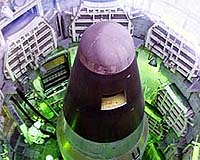| . |  |
. |
Geneva, Switzerland (UPI) Feb 1, 2009 Talks between U.S. and Russian diplomats over a new arms control treaty resumed Monday in Switzerland. The meeting in the Swiss city of Geneva is intended to help broker a successor to the Strategic Arms Reduction Treaty, or START, which expired in late 2009. Previous negotiations in Geneva in December ended without results. It's the first time in four decades that the United States and Russia do not have an arms treaty in operation. U.S. President Barack Obama and his Russian counterpart Dmitry Medvedev indicated last week that the new treaty was nearly agreed upon and could be finalized within a few weeks. U.S. national security adviser Gen. James Jones and Adm. Mike Mullen, chairman of the Joint Chiefs of Staff, met with Russian defense officials led by Gen. Nikolai Makarov, chief of the General Staff of the Russian Armed Forces, last week in Moscow for two days of closed-door talks. RIA Novosti reports that they discussed the exchange of telemetric data on strategic missiles so they can be identified when launched. The negotiations come half a year after Obama and Medvedev signed an agreement pledging a reduction of nuclear warheads from 2,200 to a range of between 1,500 and 1,675, and of carrier missiles from 1,600 to a range of between 500 and 1,100. The agreement at the time was hailed as a major step forward for U.S.-Russian relations, which had suffered over the past years with differences ranging from human rights, the independence of the former Serbian province of Kosovo, NATO's eastward expansion, a U.S.-planned missile defense system in Eastern Europe and the 2008 Russian-Georgian war. Obama has promised to shake up U.S. foreign policy by trying to improve ties with the Kremlin in a bid to get increased support from Russia in Afghanistan and in the conflict over Iran's controversial nuclear program. In an obvious bid to please Moscow, Washington last year abandoned plans for a missile defense system in Poland and the Czech Republic. Obama's predecessor, George W. Bush, had pushed for the system to defend against possible Iranian nuclear missiles. A successor to START would be a first measurable success for Obama's conciliatory Russia policy, criticized at home by Republicans and human-rights groups, who feel Washington is being silent regarding human-rights abuses by the former Cold War enemy.
earlier related report "As announced by the Russian Foreign Minister on Friday, the negotiations have restarted today in Geneva," a Russian diplomat told AFP, without specifying how long the new round of talks would last. Russian and US delegations have been meeting regularly since last May to conclude a treaty to replace the landmark 1991 Strategic Arms Reduction Treaty (START) which expired on December 5. Discussions on a new deal had largely stalled under George W. Bush's presidency. However, Barack Obama's arrival in the White House and his recent move to scrap missile shield plans in eastern Europe have provided fresh impetus for negotiations to move forward. On January 27, the United States said that talks were "nearly complete." The broad outlines of the new treaty have been clear since a summit in July, when Obama and his Russian counterpart Dmitri Medvedev agreed that the replacement treaty should slash the number of warheads on either side to between 1,500 and 1,675. The presidents also agreed that the number of carriers capable of delivering the warheads should be limited to between 500 and 1,100. The United States has said it currently has some 2,200 nuclear warheads, while Russia is believed to have about 3,000.
Share This Article With Planet Earth
Related Links Learn about nuclear weapons doctrine and defense at SpaceWar.com Learn about missile defense at SpaceWar.com All about missiles at SpaceWar.com Learn about the Superpowers of the 21st Century at SpaceWar.com
 Obama to boost spending on maintaining nuclear stocks
Obama to boost spending on maintaining nuclear stocksWashington (AFP) Jan 29, 2010 President Barack Obama's administration plans to boost spending on maintaining the US nuclear arsenal and related laboratories by more than five billion dollars in the next five years. Vice President Joe Biden warned in an opinion article in the Wall Street Journal Friday that the work force maintaining the weapons had been neglected and that nuclear facilities, some dating to World War II, ... read more |
|
| The content herein, unless otherwise known to be public domain, are Copyright 1995-2009 - SpaceDaily. AFP and UPI Wire Stories are copyright Agence France-Presse and United Press International. ESA Portal Reports are copyright European Space Agency. All NASA sourced material is public domain. Additional copyrights may apply in whole or part to other bona fide parties. Advertising does not imply endorsement,agreement or approval of any opinions, statements or information provided by SpaceDaily on any Web page published or hosted by SpaceDaily. Privacy Statement |